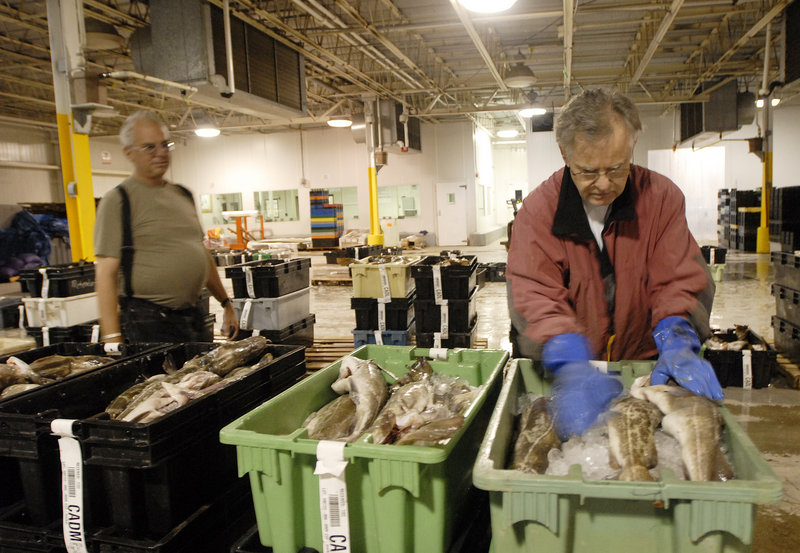PORTLAND – The city-owned fish auction has cut its payroll by 70 percent, leased a third of its warehouse space and started making money storing lobster traps and bait.
Yet that’s not enough.
Faced with a 55 percent decline in fish landings since stringent new federal regulations went into effect May 1, the city is now asking fishermen for help.
The city last week mailed a letter to the owners of more than 60 groundfishing vessels. The future of the Portland Fish Exchange is now uncertain, the letter says, and it needs increased fish landings to ensure its continued operation.
“We have been your partners in the fish business for 25 years and you have been able to trust the Exchange for fair, open trading. Now more than ever before, your support is needed for this important institution to remain operational. We need your fish.”
The letter is signed by Mayor Nicholas Mavodones Jr. and Fish Exchange President Kate Varian.
The Fish Exchange is facing “very dire straits,” said Terry Stockwell, a deputy commissioner at the Maine Department of Marine Resources and a board member of the Portland Fish Pier Authority, which leases space to the Fish Exchange. Stockwell and Commissioner George Lapointe met with Fish Exchange officials last week to discuss ways the state could help the auction house.
“The exchange needs the industry to help them if the industry wants it to be in their future,” Stockwell said. “The state and the city can’t do it alone.”
Even before the exchange’s current crisis, the auction house had suffered deep declines in fish landings because of the departure of many offshore fishing boats, which moved their operations from Portland to Gloucester and Boston.
The vessels relocated for several reasons, including closer proximity to Georges Bank and the ability to make more money selling lobsters caught in their nets, a practice banned in Maine.
The exchange needs some of the boats working in the Bay State to bring some of their fish to Portland, Mavodones said.
“There are jobs on the line,” he said. “If we can get them to come back to Portland and take out some fish, it will keep the Fish Exchange viable during these difficult times.”
Fishermen from the rest of Maine truck their groundfish to the exchange to be sold. Shrimp is also sold here. The auction house plays a critical role in supporting the industry. Without it, the industry would not survive through the current contraction, Stockwell said.
Before the exchange existed, Portland fishermen sold their catch on the city’s private docks. The buyers — who never had the chance to inspect the fish before they bought it — would take the entire catch and resell it to other wholesalers. It could take several days before fishermen found out how much they would get paid, and they were often unhappy with the price.
After it opened in 1986 as America’s first all-display fresh seafood auction, the Fish Exchange was seen as a national model for providing a fair system for establishing a market price for fish.
The exchange was financially healthy until Congress in 2006 passed new federal rules designed to protect fish stocks from overfishing.
The decline in fish landings at the exchange was dramatic. The auction house landed 17 million pounds of fish in 2006. Landings dropped to 9.4 million pounds in 2005, 8.3 million pounds in 2007 and 2008, and 6.3 million pounds in 2009.
Officials estimates the exchange this year will land 4.5 million pounds.
The exchange has an annual budget of $1.2 million. Although the city does not provide the exchange with a direct subsidy, the Fish Pier Authority this year is giving the exchange $187,000, money raised from revenue generated on the pier, mainly though parking fees.
For additional income, the exchange is now subleasing a portion of its refrigerated warehouse to Cozy Harbor, a fish processor, and a portion of a net yard to Dropping Springs, a lobster bait company, generating a total of $11,000 a month in revenues.
To save on electricity, officials closed off portions of the exchange’s refrigerated warehouse totaling about 4,000 square feet.
The exchange also replaced a human auctioneer with a cheaper computer auction system. The number of employees has dwindled from 40 to 12.
Bert Jongerden, general manager of the Fish Exchange, said new federal regulations in New England that went into effect May 1 have hurt many fishermen, particularly those who have smaller vessels and who fish near shore.
The new rules scrapped the old rationing system, which limited a boat’s days at sea, for a new one, which allocates an allowable catch to a geographical area, or sector, and gives local fishermen a share. Fishermen are given more flexibility concerning when they go out.
However, the new rules coincided with a steep reduction in the amount of fish that can be caught, and Jongerden says that many small independent fishermen aren’t being allotted enough fish to stay in business.
Jongerden said the restrictions are expected to ease up next year.
Rob Odlin of Scarborough, who owns a 44-foot gillnetter, said he’d love to sell more fish to the exchange, but the government won’t let him fish. His allocation has been cut back 75 percent, he said.
He said he doubts the fleet of Portland draggers that moved to Massachusetts will come back to Portland because they have established business relationships in their new ports and there is no economic incentive to return.
He said the exchange’s survival is critical to keeping Maine’s remaining fishing fleet intact until better days come.
If the exchange closed, Odlin said, “I’d be done. I’d go to Gloucester. I would have no choice. I would have to leave Maine.”
Staff Writer Tom Bell can be contacted at 791-6369 or at:
tbell@pressherald.com
Copy the Story Link
Send questions/comments to the editors.




Success. Please wait for the page to reload. If the page does not reload within 5 seconds, please refresh the page.
Enter your email and password to access comments.
Hi, to comment on stories you must . This profile is in addition to your subscription and website login.
Already have a commenting profile? .
Invalid username/password.
Please check your email to confirm and complete your registration.
Only subscribers are eligible to post comments. Please subscribe or login first for digital access. Here’s why.
Use the form below to reset your password. When you've submitted your account email, we will send an email with a reset code.